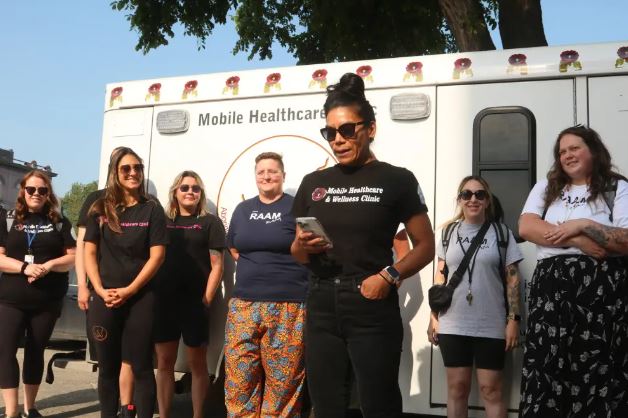Toronto: Across Canada, innovative community care programs are making a profound impact, exemplified by two remarkable initiatives in Scarborough and Winnipeg. These programs, though distinct in their approaches, share a common goal: to bridge gaps in health and wellness and foster a sense of community support, as reported by CBC News. Photo credits: CBC News.
Scarborough's Beacon of Hope: Adanac Apartments Food and Health Program
In Scarborough, Toronto, the Adanac Apartments food program has become a lifeline for many. Every second Tuesday, residents gather with reusable bags not just to collect fresh produce but to access a range of health services. This bi-weekly event features crates of essential groceries like potatoes, peppers, and milk, alongside critical health support provided by a dedicated team.
The integrated approach of this program is nothing short of transformative. Managed by Mark Dwyer from the Canadian Mental Health Association, the initiative blends food distribution with health care, offering services from a concurrent disorder’s specialist, a nurse, and two case managers. Dwyer notes, "The food is what brings people in, but it's the health care that truly makes a difference." This model not only addresses immediate nutritional needs but also connects residents with essential health services, significantly reducing emergency room visits.
Mike Morgan, who helped launch the program, envisioned food as a means to build trust and foster connections. Despite his passing, his legacy lives on through the program’s success, which has seen a rise in registration from 37 to 102 residents. For individuals like Lori Prielle, who manages arthritis and diabetes, the program has been a source of both physical and emotional support. "Michael has been a godsend," Prielle says of the program's nurse, illustrating the deep personal connections formed through this initiative.
Winnipeg's Mobile Health Clinic: Bringing Care to Those in Need
In Winnipeg, a groundbreaking mobile health clinic is changing how health care reaches vulnerable populations. Launched through a collaboration between the Manitoba government and the Aboriginal Health and Wellness Centre, this pilot project aims to provide essential primary care to at-risk groups, including the homeless.

Operating five days a week, the mobile clinic visits community organizations and homeless encampments, offering services such as wound care, blood tests, and naloxone kits for overdose treatment. The clinic is staffed by a multidisciplinary team including a doctor, nurse, mental health crisis counselor, and Indigenous social planner. Laiza Pacheco, Director of Mobile Health Care at the Centre, emphasizes, "Many of our clients face profound barriers to accessing traditional health services. We’re committed to meeting them where they are."
This initiative is more than just a medical service; it’s a lifeline that integrates cultural support into its offerings. Indigenous social planner Connor Keeper incorporates cultural ceremonies like smudging into the care provided, which can significantly enhance mental health and recovery. With $1.2 million allocated for the pilot, the Manitoba government hopes to address rising rates of HIV and other health issues, and early results are promising, with around 450 people already served.
A Shared Vision of Compassionate Care
Both the Adanac Apartments food program and Winnipeg’s mobile health clinic demonstrate the power of community-driven solutions in addressing health and social challenges. By integrating necessities with essential health services, these programs not only meet immediate needs but also build trust, foster connections, and support holistic well-being.
As we face ongoing challenges in health care and food insecurity, these initiatives stand as inspiring examples of how compassion and innovation can create meaningful change in our communities. Through continued support and expansion, programs like these offer a hopeful vision for a more connected and supportive society.